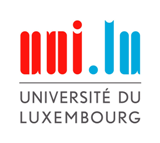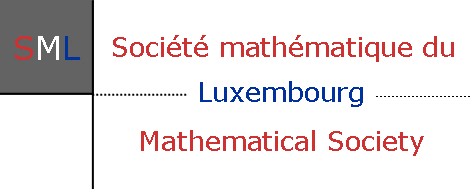Supported by:

University of Luxembourg
Mathematics Research Unit
Programme
The scientific programme will start in the morning of Friday, June 15 and last till Saturday, June 16, 2012 around noon. The talks will be given by the folowing speakers (as of June 14, 2012):
- Jørgen Ellegard Andersen (Aarhus)
- Wolfgang Bertram (Nancy)
- Pierre Bieliavsky (Louvain)
- Simone Gutt (Brussels)
- Xiaonan Ma (Paris)
- Christoph Wockel (Hamburg)
- Jonathan Pfaff (Bonn)
- Friedrich Wagemann (Nantes)
- Cornelia Vizman (Timisoara)
- Werner Müller (Bonn)
Programme (available also as pdf-file).
Friday, June 15, 2012
| 9:00–10:00 | Talk 1: Jørgen Ellegard Andersen, The geometric construction of the Reshetikhin-Turaev Topological Quantum Field Theory
Abstract: In this talk, we will discuss the geometric construction of the Reshetikhin-Turaev Topological Quantum Field Theory using the geometric quantization of the moduli spaces of flat connections on two dimensional surfaces. We will then discuss various results on the large level asymptotics of these theories. |
| 10:00–10:30 | Coffee break |
| 10:30–11:30 | Talk 2: Simone Gutt, $Mp^c$-structures and Dirac operators
Abstract: The metaplectic group is a double extension of the symplectic group whereas $Mp^c$ is a central circle extension. As in the Riemannian case for $Spin$ and $Spin^c$, constructions involving a metaplectic structure can be generalized to $Mp^c$ structures; the main advantage is that those exist on any symplectic manifold. We consider various types of Dirac operators and Parthasarathy type formulas on some symmetric spaces. |
| 11:30–11:40 | Short break |
| 11:40–12:40 | Talk 3: Cornelia Vizman, The group structure for jet bundles over Lie groups
Abstract: The jet bundle JkG of k-jets of curves in a Lie group G has a natural Lie group structure. We present an explicit formula for the group multiplication in the right trivialization and for the group 2-cocycle describing the abelian extension Jk+1G of JkG by $\mathfrak{g}$. |
| 12:40–14:30 | Lunch break |
| 14:30–15:30 | Talk 4: Xiaonan Ma , Asymptotic torsion and Toeplitz operators
Abstract: If X is a odd dimensional compact Riemannian manifold and F is a complex flat vector bundle on X such that its cohomology is zero, then the Ray-Singer analytic torsion is a real spectral invariant which by different versions of Cheeger-Müller theorem, can be computed by the combinatorial torsion, which gives the information on the size of the torsion group in the cohomology in the arithmetic case. We use Toeplitz operators to evaluate the leading term in the asymptotics of the analytic torsion associated with a family of flat vector bundles Fp, thus extending results obtained by Müller for the analytic torsion on 3-dimensional hyperbolic manifolds. For $p\in \N$, the flat vector bundle Fp is the direct image of Lp, where L is a holomorphic positive line bundle on the fibres of a flat fibration by compact Kähler manifolds. The leading term of the analytic torsion is the integral of a locally defined differential form. This is a joint work with Jean-Michel Bismut and Weiping Zhang. |
| 15:30–16:00 | Coffee break |
| 16:00–17:00 | Talk 5: Jonathan Pfaff , The asymptotics of the analytic torsion on hyperbolic manifolds of
finite volume
Abstract: We will introduce the analytic torsion for complete 2n+1-dimensional hyperbolic manifolds of finite volume with coefficients in flat vector bundles which arise by restricting a representation of the Lie group G=Spin(2n+1,1) to the fundamental group of the manifold. Our main result is an asymptotic formula for the analytic torsion with respect to certain rays of representations. This result was established in joint work with Werner Mu"ller. Moreover we will briefly discuss the meromorphic continuation of Ruelle and Selberg zeta functions on hyperbolic manifolds with cusps and describe their relation to the analytic and the combinatorial torsion in the 3-dimensional case. |
| 17:00–17:10 | Short break |
| 17:10–18:10 | Talk 6: Christoph Wockel , A smooth model for the string group
Abstract: The string group is an object of recent interest on the border between geometry and algebraic topology. In the talk we will explain what the string group is and discuss some of the fundamental hindrances in constructing explicit models for it. It will turn out that with some ad-hoc constructions is is possible to construct a model as an infinite-dimensional Lie group. In the end of the talk we will see how these constructions can be understood systematically in the context of Lie 2-groups. |
| 20:00 | Conference dinner |
| 9:00–10:00 | Talk 7: Friedrich Wagemann, On 2-Holonomy
Abstract: This is a report on joint work with H. Abbaspour. In this work, we define a Hochschild cycle which encodes the holonomy of a non-abelian gerbe in the same way as ordinary holonomy of a principal G-bundle is described as a Hochschild cycle of the DG algebra of differential forms on the underlying manifold. The gerbe holonomy cycle lives in higher Hochschild homology w.r.t. the 2-torus. One key point in our construction is the possibility (up to equivalence) to choose the structure Lie algebra crossed module h -> g of the gerbe such that the Lie algebra h is abelian. |
| 10:00–10:30 | Coffee break |
| 10:30–11:30 | Talk 8: Pierre Bieliavsky , Oscillating twists and their quantum symmetries
Abstract: We present a general notion of oscillating integral for tempered Lie groups allowing to define Fréchet multiplier Hopf-algebras affiliated to Lie groups that provides a nice non-formal topological framework for Drinfel'd twists. In the case of Drinfel'd twists based on a Kahlerian Lie group, this notion of ``oscillating twists" underlies multiplicative unitaries in the sense of Baaj and Skandalis that non-trivially deform the classical Kac-Takesaki operator on the group. The construction is entirely explicit. Part of this work is joint with F. D'Andrea and V. Gayral. |
| 11:30–11:40 | Short break |
| 11:40–12:40 | Talk 9: Wolfgang Bertram , From groups to projective geometry: back and forth
Abstract: I will report on links between group theory and projective geometry: - by a simple geometric construction, we attach loops, torsors and groups to projective geometries (joint work with M. Kinyon, in progress), - conversely, to every group we can attach a geometry sharing many important features with usual projective geometry (B., arxiv : math.GR/1201.6201). |
Social dinner
A social dinner is foreseen on Friday June, 15, 2012 at 20:00 (8 p.m.).
If you want to participate in the social dinner on Friday
evening you will have to contribute 20 Euros in cash to be paid during the
meeting.
The speakers will need to contribute 10 Euros.
You have also to specify your menu choice in your registration:
- Option a: Menu with the main course: beef (Pièce de boeuf grillée sauce poivre, galette de pommes de terre)
- Option b: Menu with the main course: fish (Mixed grill de poissons fins, poêlée de légumes de saison)
- Option c: Vegetarian menu
- Option d: Vegan menu
